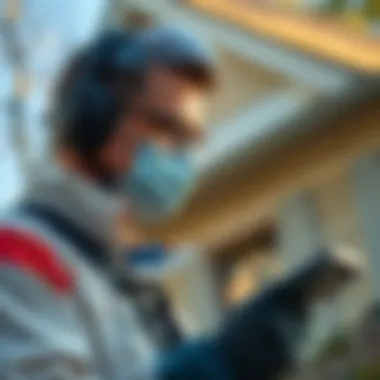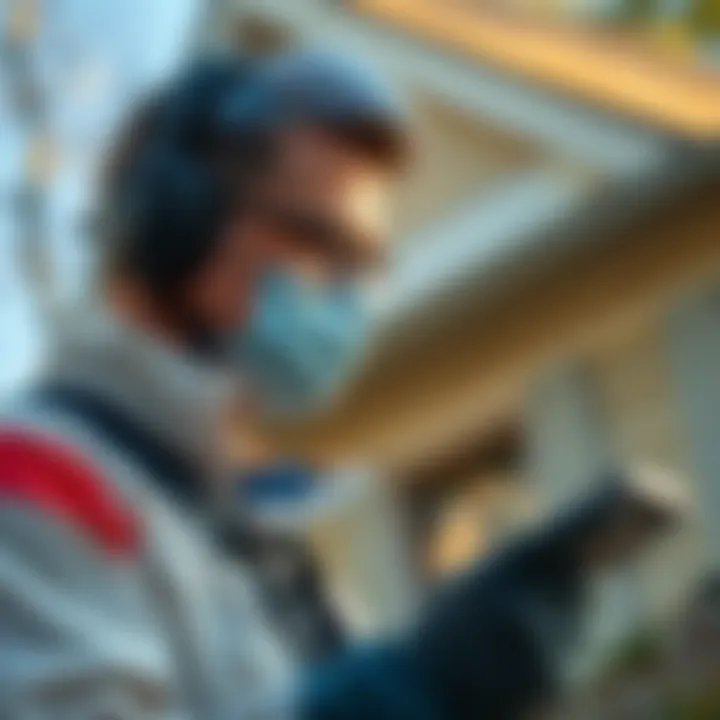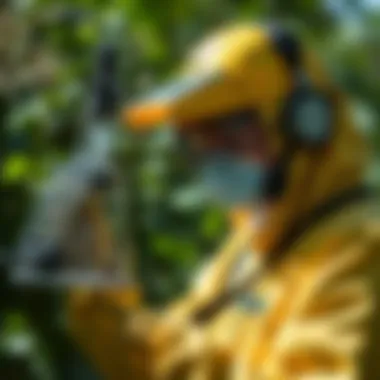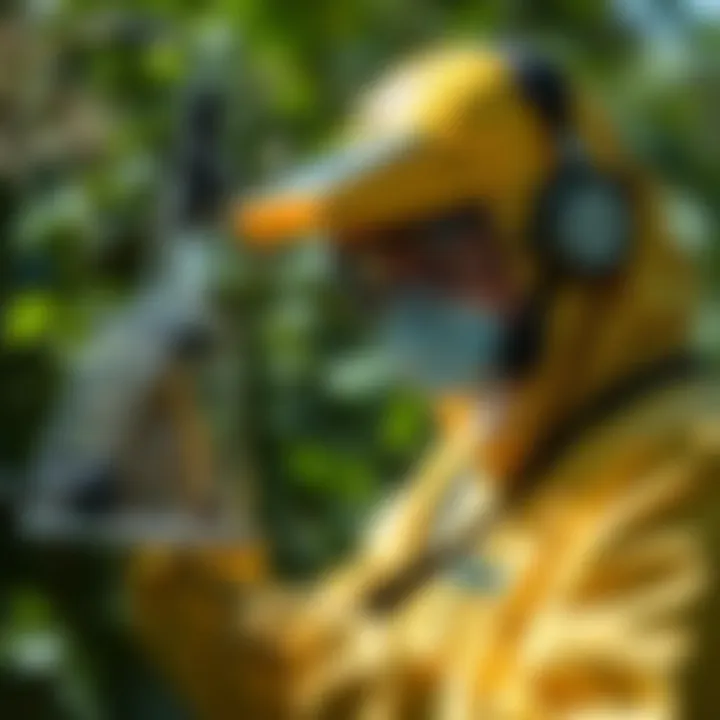In-Depth Analysis of Pest Control Services in Huntsville, AL


Intro
In the ever-evolving world of home maintenance, one topic that often draws considerable attention is pest control. Homeowners in Huntsville, AL grapple with a diverse array of pests due to the region's unique climate and landscape. From pesky ants that invade kitchens to more concerning situations involving rodents, understanding how to manage these unwanted guests becomes a priority. This article aims to provide a clear and comprehensive overview of pest control companies in Huntsville, diving into their methodologies, technology, and eco-friendly practices. Through this exploration, homeowners will be equipped with the knowledge they need to make informed decisions when working with pest management professionals.
Understanding Pests
Definition of Pests
Pests are essentially any organisms that negatively impact human activities or health. This can range from insects like mosquitoes and termites to larger animals such as raccoons and squirrels. Many pests are not only annoying but can also cause significant damage to property and pose health risks through the transmission of diseases. For instance, in Huntsville, the humidity often leads to a higher presence of termites, which can silently eat away at wooden structures without a trace until it’s too late.
Importance of Pest Identification
Identifying pests accurately is crucial for implementing effective control strategies. Misidentifying a pest can lead to using the wrong treatment, which may not only be ineffective but also harmful to the environment and human health. Furthermore, understanding the lifecycle and behavior of specific pests such as bed bugs or cockroaches can help tailor control measures effectively. Getting to the root of a pest problem requires an expert eye; hence many pest control professionals in Huntsville offer free consultations and inspections to address concerns directly.
Prevention Techniques
Home and Garden Preventative Measures
Preventing pests before they settle in is always the ideal approach. Here are some key techniques that homeowners can adopt:
- Sealing Entry Points: Small gaps and cracks around windows, doors, and foundations can serve as inviting entrances for pests. Using caulk or weather stripping can indeed help.
- Proper Waste Management: Make sure to secure trash bins and compost heaps. Regular cleaning up can discourage many pests from making a home in your yard.
- Landscape Management: Keeping plants trimmed and removing dead debris can reduce hiding spots for pests, making your garden less attractive.
Seasonal Prevention Tips
Each season brings different pest threats. For instance, in spring, homeowners might notice more ants and termites emerging, while colder months often lead rodents to seek warmth indoors. Here are seasonal tips to consider:
- Spring: Inspect wood for signs of termites and treat any infestations promptly. Planting pest-resistant landscaping can deter unwanted visitors.
- Summer: Keep an eye on standing water, as it attracts mosquitoes. Eliminating these sources can significantly diminish their population.
- Fall: Inspect attics and basements for entry points for rodents and seal them before winter.
- Winter: Ensure your home is well-insulated and check for drafts that might invite pests inside.
Eco-Friendly Pest Control Solutions
Overview of Sustainable Practices
As awareness grows regarding environmental impacts, many pest control companies in Huntsville now offer eco-friendly solutions. These practices aim to minimize chemical usage and promote natural alternatives. Integrated Pest Management (IPM) is a popular approach that combines various strategies for pest control, focusing on prevention and the use of natural pest deterrents.
Natural Remedies and Their Effectiveness
Many homeowners lean towards natural pest control solutions to mitigate health risks associated with chemical treatments. Here are some common natural remedies:
- Diatomaceous Earth: This powdery substance can effectively kill soft-bodied insects upon contact without chemicals.
- Essential Oils: Oils such as peppermint and tea tree oil can deter pests when diffused or sprayed around the home.
- Vinegar Solutions: Mixing vinegar with water creates a pesticide that can repel ants and other insects effectively.
"Integrated pest management combines common-sense practices with scientific principles to manage pest problems in a humane and environmentally friendly way."
By understanding local pest dynamics and the control options available, homeowners can better protect their living environments, ensuring their homes remain safe and free from unwanted inhabitants. This proactive approach is essential for long-term pest management and maintaining a healthy home.
Prelims to Pest Control Industry
The pest control industry plays a critical role in safeguarding public health and maintaining the quality of living environments. Its significance extends far beyond merely eliminating unwanted creatures; it encompasses preventing property damage, ensuring food safety, and protecting the safety of residents. The importance of pest control cannot be overstated, especially given the rapid population growth and the corresponding increase in urban development, which often leads to pest infestations.
Definition and Importance of Pest Control
Pest control can be defined as the regulation or management of a species defined as a pest, typically pertaining to insects and rodents that threaten biodiversity, or the ecological balance. Effective pest control is especially important in residential areas, where common nuisances include rodents like Rattus norvegicus and insects such as cockroaches and ants.
Implementing pest control measures is essential for several reasons:
- Health Protection: Many pests carry diseases that can directly impact human health. For instance, mosquitoes are notorious for spreading the West Nile virus and Zika virus.
- Prevent Property Damage: Rodents can gnaw through wiring and wooden structures, creating costly repairs.
- Food Safety: Pests can contaminate food supplies, making them unsafe for consumption.
In the context of Huntsville, AL, with its diverse ecosystem and numerous residential and commercial properties, the pest control industry serves as a shield against these commonplace threats, ensuring that this community thrives in a healthy environment.
Overview of the Pest Control Market
The pest control market has grown significantly in recent years, driven by increased awareness of health concerns and pest-related risks. According to industry reports, the global pest control market size was valued at USD 18.4 billion in 2018 and is expected to expand at a compound annual growth rate (CAGR) of 4.5%.
Several factors drive this growth, including:
- Urbanization: Rapid urban expansion leads to more pest encounters as homes are built closer to nature.
- Climate Change: Alterations in weather patterns can expand the habitat ranges for many pests.
- Increased Regulations: Government policies increasingly demand safer pest control solutions, driving innovation and eco-friendly practices.


Additionally, the market in Huntsville reflects national trends, with a focus on integrated pest management (IPM) strategies that balance pest control needs with environmental considerations. This local market showcases a mix of established companies and emerging startups offering specialized services, tailored to the unique demands of Alabama residents.
"The pest control market is continuously evolving, aligning itself with modern-day demands and sustainable practices."
In summary, pest control is much more than a reactionary measure. It involves a proactive stance in maintaining a quality living environment and ensuring that community wellness takes precedence. As we delve deeper into the specifics of the pest control landscape in Huntsville, understanding these foundational aspects of the industry will enhance the appreciation of local practices and available services.
Pest Control Landscape in Huntsville, AL
Huntsville, Alabama, is not just the Rocket City known for its space exploration; it also grapples with a unique pest control landscape. This aspect is crucial, as the region's diverse climate and geographical features create a distinctive environment conducive to various pests. Understanding this landscape helps residents and pest control professionals align their strategies effectively, ensuring a pest-free home and workspace. The local pest control industry not only focuses on eradicating these nuisances but also emphasizes sustainable practices that protect both health and the environment.
Common Pests in Huntsville
Rodents
Rodents, which include rats and mice, are prevalent in Huntsville and can be quite a headache for residents. What makes rodents particularly challenging is their ability to reproduce rapidly; a single pair can produce dozens of offspring in a year. This aspect alone makes them a prime target for pest control services. They are sneaky creatures that often find their way indoors through small openings, leading to potential health risks as they can carry diseases.
Moreover, the presence of rodents can often signify other issues, like poor sanitation practices or structural problems in a home. For homeowners, understanding rodent behavior can be quite beneficial; knowing their habits helps in formulating effective control measures. Notably, if caught early, issues related to rodents can often be remedied with relatively straightforward solutions.
Insects
Insects, from cockroaches to ants and termites, also thrive in Huntsville. Among these pests, termites pose the greatest risk to property, being capable of causing extensive damage if left unchecked. Cockroaches, on the other hand, are known to be resilient and can survive in harsh conditions, making their extermination a daunting task.
Interestingly, certain insects like ladybugs and bees play a role in the local ecosystem and become a part of debates on pest management. This presents a unique challenge since pest control companies must balance between eliminating harmful pests while also conserving beneficial insects. The challenge is in using methods that effectively target the harmful species without disrupting the ecosystem.
Wildlife
Wildlife pests such as raccoons and opossums also populate the Huntsville area. These animals, while often beautiful and interesting to watch, can leave quite a mess and cause damage to property. Raccoons, for example, are notorious for rummaging through trash cans and can even enter attics. These encounters can lead to health hazards, such as exposure to parasites and diseases that wildlife may carry.
Understanding wildlife behavior is a critical aspect of pest management. Professionals often utilize more humane methods to deter these animals, like providing proper waste storage and installing barriers. This approach ensures safety for both the wildlife and the residents, creating a win-win situation.
Seasonal Pest Trends
Pest control isn’t a one-size-fits-all solution in Huntsville. Seasonal trends play a significant role in which pests become problematic throughout the year. For instance, spring and summer bring out an increase in insect activity, particularly ants and mosquitoes. In contrast, rodents tend to seek shelter indoors as temperatures drop in the fall and winter months.
Understanding these patterns allows both pest control professionals and homeowners to proactively manage pest issues before they escalate. Investment in preventive measures during peak seasons can save time, stress, and money in the long run.
Types of Pest Control Services Offered
When dealing with pest issues, it's crucial to know the types of services available in Huntsville. An understanding of these can guide homeowners in selecting the right approach, ensuring that the problem is tackled effectively while considering cost and safety. The right service not only rids a space of pests but also focuses on preventing future infestations. Let's dive into the primary types of pest control services offered in the area.
Residential Pest Control
Residential pest control is designed for individual homes. This service typically includes treatments for various common pests like ants, spiders, and termites. These treatments are essential to ensure a safe and comfortable living environment. Homeowners can benefit significantly from regular maintenance programs, which not only prevent infestations but also promote peace of mind. Many pest control companies in Huntsville offer personalized plans that take into account the specific vulnerabilities of a household. One prominent characteristic is the flexible scheduling, which allows homeowners to choose times that suit their lifestyle. Regular inspections are also part of the package, aiming to catch pest issues before they escalate into costly problems.
Commercial Pest Control
Commercial pest control focuses on businesses, which have different needs compared to residential properties. This service is vital in industries like food service, hospitality, and retail where a pest infestation can lead to severe ramifications, including health code violations and loss of reputation. Pest control providers often deploy comprehensive strategies that comply with industry regulations. A key aspect of commercial pest control is the emphasis on minimal disruption to business operations. Technicians may conduct treatments during off-peak hours or utilize methods tailored to busy environments. These services not only protect the physical premises but also safeguard a business's bottom line, enhancing customer trust and satisfaction.
Specialty Services
Specialty services in pest control target particular problems that may not fall under standard pest management. These specialized treatments often require unique methods or equipment, addressing issues such as termites, bed bugs, and rodents.
Termite Control
Termites can cause extensive damages to wooden structures, and therefore, a dedicated termite control service is paramount. This service involves detailed inspections to identify infestations, followed by targeted treatments. One key characteristic of termite control is the use of preventative barriers. These barriers are installed to thwart future termite activity. The treatment methods often involve either bait systems or liquid applications that can penetrate the soil, creating a protective zone around a property. Homeowners taking preventive measures through termite control can save a significant amount of money in repairs down the line, making it a beneficial choice.
Bed Bug Treatment
Bed bug treatment has gained importance in recent years as these pests become more prevalent. The process typically includes thorough inspections of mattresses, bed frames, and other hiding spots. A notable aspect of bed bug treatment is the use of heat remediation methods, which raise the temperature in infested areas to eliminate bugs effectively. While highly effective, this service can be disruptive, requiring homeowners to adjust their schedules while treatments take place. However, given the nature of bed bug infestations, investing in this specialized service can lead to a substantial improvement in overall living conditions.
Rodent Management
Rodent management is essential, particularly in Huntsville, where houses can sometimes be close together, creating ideal conditions for rodent activity. This service emphasizes not only removing existing rodents but also identifying and sealing entry points to prevent future infestations. Key characteristics include the use of traps, bait stations, and ongoing monitoring. One unique feature of rodent management is the adoption of humane methods to handle these pests. While rodent control can sometimes involve unpleasant tasks, it is crucial for protecting health and property. An effective rodent management plan helps preserve the structural integrity of a home and mitigate health risks associated with rodent droppings.
Ultimately, understanding the various pest control services offered can help you make informed decisions for your home or business in Huntsville. Whether it’s through proactive measures or specialized treatments, addressing pest issues promptly and effectively is key to maintaining a safe environment.
Criteria for Selecting a Pest Control Company


When it comes to managing pest issues, homeowners often find themselves at a crossroads, wondering which pest control company to trust. With a plethora of options available, it can be daunting to sift through and find the right fit. Therefore, understanding the criteria for selecting a pest control company is pivotal not just for effective pest management but also for ensuring safety and environmental considerations. Let’s delve into the essential factors that should guide decision-making in this crucial aspect of home maintenance.
Licensing and Certification
A foundational step in selecting a pest control company is verifying its licensing and certification. Each state comes with specific regulations governing pest management services, and Alabama is no exception. Pest control operators are required to hold valid licenses, demonstrating they have met the educational and professional requirements necessary for operating in the industry. This not only reflects a baseline of competence but also ensures that the company adheres to state regulations designed to protect both consumers and the environment.
When evaluating potential companies, ask for proof of licensing and review any certifications from organizations such as the National Pest Management Association (NPMA) or state-specific governing bodies. Such certifications often indicate a commitment to safe practices and ongoing training in pest control methods. In other words, if a company can flaunt these credentials, it’s a good sign they take their job seriously.
Experience and Reputation
Experience in the pest control industry can’t be overlooked. Companies that have been in business for several years often boast a wealth of knowledge about local pest populations and effective management strategies. Not all pests are the same; understanding how to tackle specific species prevalent in Huntsville requires not just training but also real-world experience. Established companies are more likely to have refined their techniques over time and built a reputation based on quality service.
But it isn't just aging years; it’s also about the quality of work that’s done. Look toward online reviews and ratings on platforms like Google or Yelp. A company with consistently positive feedback is often a safe choice. Conversely, a trail of complaints indicates potential red flags. It’s worth the time to do some homework here, as a reputable company will often be described in glowing terms by satisfied customers.
Customer Reviews and Testimonials
In today’s world, word of mouth extends beyond friends and family; online reviews have become the new norm for assessing service quality. Gathering insights from customer reviews can provide an invaluable perspective on the pest control experience. They often highlight not only the effectiveness of services but also elements like customer service, pricing transparency, and overall satisfaction.
When researching a pest control company, focus on both the number of reviews and the overall rating. A good sign is a healthy mix of recent reviews, which can showcase current practices and customer opinions. Don’t shy away from reaching out to friends or neighbors who have used specific businesses as they can provide firsthand experiences that may validate online claims.
"Choosing the right pest control company is crucial—it’s not just about pests; it’s about trust, safety, and peace of mind."
As you weigh your options, remember that selecting a pest control company isn’t just about getting rid of unwanted critters; it’s about establishing a relationship built on professionalism and trust. Focus on licensing, reputation, and real customer testimonials to navigate your choices. With options in Huntsville, AL, being both numerous and varied, these criteria will guide you toward making an informed decision.
Eco-Friendly Pest Control Options
In the contemporary landscape of pest management, eco-friendly methods have become increasingly significant for both environmental sustainability and effective pest control. The rising awareness of environmental issues has prompted homeowners in Huntsville, AL, to seek alternatives that minimize harm to ecosystems while effectively managing pest-related concerns.
Understanding Integrated Pest Management
Integrated Pest Management (IPM) is a strategic approach blending various pest control techniques to create a sustainable, long-term solution. This method focuses on prevention alongside control, minimizing chemical usage while maximizing effectiveness. Key components of IPM include monitoring pest populations, identifying pests accurately, and determining the right action thresholds. For instance, if a family notices increased ant activity but finds that they don't pose a health risk, they might decide to let nature run its course instead of resorting to pesticides.
Some practical elements of Integrated Pest Management include:
- Regular Inspections: Conducting routine checks helps catch problems early and maintain a pest-free environment.
- Cultural Controls: Adjusting sanitation practices, like ensuring trash is regularly disposed, can deter pests.
- Biological Controls: Introducing natural predators like ladybugs to manage aphid populations exemplifies a biological strategy within IPM.
By embracing IPM, Huntsville residents can strike a balance between effective pest control and environmental stewardship.
Natural Pest Control Methods
Natural pest control methods offer another avenue for eco-friendly solutions, utilizing organic substances and techniques rather than synthetic chemicals. These approaches are particularly appealing to homeowners who prioritize their family’s health and the planet’s wellbeing. Examples of these methods include:
- Essential Oils: Oils like peppermint can repel insects naturally. Spraying a diluted mixture of peppermint oil around entry points might keep unwanted pests at bay.
- Diatomaceous Earth: A naturally occurring soft rock can be ground into powder and used to target insects like cockroaches and ants. It’s safe for humans and pets but lethal to many pests.
- Soap Sprays: Simple soap solutions can suffocate pests like aphids on plants while remaining harmless to the plants themselves.
Adopting these natural methods not only aids in pest control but often enhances the overall health of local ecosystems. Homeowners can feel good knowing they’re contributing to a healthier environment.
"The move towards eco-friendly pest control is not merely a trend but a necessary evolution in response to our changing world."
Ultimately, understanding and implementing these eco-friendly pest control options will empower homeowners in Huntsville, AL. They can effectively manage pest issues while also championing sustainable practices that protect our shared environment.
Technological Advances in Pest Control
As the world continues to evolve, pest control is also not left behind in embracing technology. The advances in this field are about more than just making the job easier; they also bring about greater efficiency and effectiveness in pest management. Using technology, companies in Huntsville, AL, can provide targeted solutions that not only eradicate pests but also help in safeguarding the environment. This section delves into some remarkable technologies that are reshaping pest control strategies today.
Use of Drones and Precision Tools
Drones have been a game-changer in various industries, and pest control is no exception. In Huntsville, companies are beginning to utilize drones for surveillance and pest management assessments. By employing drones equipped with high-resolution cameras, pest control professionals can gain a bird's eye view of properties and surrounding areas. This technology allows them to identify potential risk factors and hotspots where pests may thrive.
- Mapping Infestations: Drones make it easier to map infestations before they escalate into larger problems. By gathering data about pest locations, companies can impose targeted treatments, reducing unnecessary pesticide use.
- Accessibility: Areas that are difficult to reach can now be easily surveyed. No more climbing ladders or crawling under buildings. Drones can access rooftops or nooks without putting anyone at risk.
- Monitoring Treatments: After treatments are applied, drones can help monitor the effectiveness of these methods, ensuring that pests are not returning or that infestations are being controlled properly.
The use of precision tools like thermal cameras further enhances the ability to detect pests. By spotting temperature variations that pests often cause, professionals can identify where they are most active and focus their efforts there.
Smart Sensors for Monitoring
Smart sensors are revolutionizing the way pest control is approached in Huntsville. These advanced devices can be installed in various locations around a property to provide real-time monitoring of pest activity. Their benefits can’t be overstated.
- Proactive Solutions: Rather than waiting for a pest problem to manifest visibly, smart sensors alert pest control companies before they become significant issues. It’s like having a security system but for your pest problems.
- Data Collection: These sensors collect data over time, giving pest control experts invaluable insights into trends and patterns at different times of the year. This information can inform both immediate treatments and long-term pest management strategies.
- Cost-Effective: By identifying specific areas of concern, homeowners may save on unnecessary treatments. Instead of blanket spraying an entire building, targeted measures can yield better results and minimize costs.


This innovative approach allows pest management to be predictive rather than reactive, which is a significant shift in the industry.
Regulations and Safety Standards
In the realm of pest control, regulations and safety standards play a pivotal role in ensuring that both the customers and the technicians remain protected while effectively addressing pest problems. The significance of these regulations cannot be overstated as they dictate the methods that pest control companies must adhere to, ensuring that their practices are safe, environmentally friendly, and effective.
Regulations typically vary from state to state, guiding pest control operators on permissible chemicals, application procedures, and safety measures. In Huntsville, Alabama, local pest management firms must comply with state laws that govern pesticide usage, application methods, and safety protocols for both clients and technicians. These requirements not only help protect human health but also safeguard wildlife and the surrounding environment from potentially hazardous chemicals.
By understanding and adhering to these regulations, pest control companies can avoid legal repercussions and foster trust with customers. It ensures they are addressing pest issues responsibly and effectively, which is an integral concern for homeowners and property managers alike. With the heightened awareness of environmental issues, adhering to these regulations also marks a company's commitment to sustainability.
"Regulations in pest control are not just about compliance; they are about creating a safer community environment."
State Requirements in Alabama
The state of Alabama has established specific requirements for pest control that technicians and companies must follow. These requirements are set forth by the Alabama Department of Agriculture and Industries (ADAI), which oversees pest control regulations within the state. Some of the essential state requirements include:
- Licensing and Certification: All pest control operators must obtain a license from ADAI. This typically involves passing exams that cover pest biology, pesticide safety, and application techniques.
- Pesticide Registration: Any chemical used in pest control must be registered with ADAI. This ensures that the substances employed are both effective and safe for use within residential and commercial properties.
- Record Keeping: Companies are required to maintain detailed records of pesticide applications, including product type, quantity, service location, and technician involved. These records are vital for tracking pesticide usage to ensure compliance with safety regulations.
- Notification Procedures: Pest control providers must notify property owners or occupants about intended pesticide applications, along with providing safety information related to these chemicals. This promotes transparency and customer awareness regarding pest treatments.
These state requirements are designed to foster a responsible pest control culture, where safety is a priority. Homeowners in Huntsville can always inquire about a company's license and certifications to ensure they are getting professional, regulated services.
Best Practices for Safe Pest Control
Navigating the world of pest control necessitates an understanding of best practices that ensure safety at every step. Pest control should always prioritise the health and safety of everyone involved while striving for effective pest eradication. Here are a few recommended practices:
- Use of Integrated Pest Management (IPM): IPM combines multiple tactics to manage pests effectively, focusing on long-term prevention and minimal chemical usage. This holistic approach involves understanding the pest lifecycle, habitat, and natural predators.
- Select Appropriately Approved Chemicals: Adopting chemicals that meet safety standards is a must. Pest control companies need to be familiar with the products they use and their potential side effects, ensuring they opt for the least toxic options wherever possible.
- Proper Equipment Usage: Trained technicians should only use authorized equipment for application. Proper usage helps prevent unnecessary exposure to harmful substances.
- Educate the Clients: Providing clients with detailed information on the pest treatment process, potential risks, and safety protocols encourages trust. It empowers clients with knowledge on how to maintain safety during and after treatments.
- Regular Training and Updates for Technicians: Ongoing education about new regulations and emerging pest control technologies ensures that technicians are always operating within best practices.
Emphasising these best practices not only fulfills necessary regulations but also builds a responsible business model that can profoundly impact the health of the community and the environment at large.
Cost Considerations in Pest Control
When dealing with pest problems, understanding the costs involved can make a significant difference. Pest control is not merely about eliminating unwelcome critters but also about ensuring the long-term safety and comfort of your home. We must appreciate how various factors weigh into the pricing schema. Homeowners often find themselves wrestling with questions of value—is the service worth the price? That’s where a comprehensive look at costs comes into play, highlighting service benefits and underlying considerations that can guide effective decision-making.
In Huntsville, AL, there’s a wide range of pest control services, and prices can vary considerably. The range of options means that a detailed exploration of what drives these costs can help consumers make informed choices. After all, pest management is not just a one-time affair but rather, a necessary investment into the well-being of your living space.
Factors Influencing Pricing
Several elements shape how much you'll spend on pest control services. Here are a few of the most significant ones:
- Type of Pest: Different pests require different control methods. For example, dealing with a termite infestation often incurs higher costs compared to treating a common household ant problem.
- Extent of Infestation: If the problem is widespread, service providers may need more time and resources to deal with it effectively. Rates can climb based on the size of the area involved and the severity of the infestation.
- Service Frequency: Some homeowners opt for regular maintenance plans that might seem pricier at first glance but can save money over time. A quarterly service can help keep pests at bay rather than calling for emergency treatments.
- Method of Treatment: Traditional chemical treatments can differ significantly in cost from eco-friendly or integrated pest management approaches. The latter may require more expensive materials or sophisticated techniques, which can be reflected in the price.
- Location and Accessibility: Geographic factors also play a role. If your property is situated in an area that is harder to access, this might increase the service charge due to additional travel time or special equipment needs.
By being aware of these influencing factors, homeowners can better gauge what they’re paying for and why it may vary from service to service.
Comparative Cost Analysis of Services
Navigating the pest control landscape means weighing costs against services rendered. Below is a simple comparison of the costs associated with various pest control approaches to give a clearer picture of what to expect:
- Annual Pest Control Plans: Many companies offer packages that cover regular monitoring and treatment throughout the year. Prices range from $300 to $600, depending on the pest type and area size.
- One-Time Treatments: If you opt for a one-time service, prices typically fall between $150 to $400. This is often effective for less severe issues but may not provide long-term assurance.
- Eco-Friendly Options: Green pest control methods usually sit on the higher end of the pricing scale, averaging $200 to $700. However, these methods can appeal to environmentally-conscious homeowners.
The pricing information, while a useful guide, should also be considered in conjunction with factors such as reputation and effectiveness of the pest control companies in Huntsville. Homeowners are encouraged to ask potential service providers for detailed estimates that outline what each service entails.
"Knowing costs upfront can save time and prevent nasty surprises later on."
Ultimately, understanding these cost considerations ensures that you are equipped with the knowledge needed to make sound choices in pest control, leading to a more comfortable and secure home environment.
Finale
Understanding the pest control landscape in Huntsville, AL, is essential not just for homeowners but also for anyone interested in maintaining a clean and safe environment. By recognizing the need for effective pest management, locals can make informed choices when selecting pest control services. This article not only sheds light on the strategies employed by various providers but also dives deep into the ecological and safety implications of those methods.
Future of Pest Control in Huntsville
Looking ahead, the future of pest control in Huntsville will likely hinge on evolving technologies and customer demands. The integration of artificial intelligence and data analytics into pest management can aid companies in predicting pest infestations based on environmental conditions and past incidents. Moreover, as awareness of environmental issues grows, homeowners may gravitate towards more sustainable practices.
For instance, from trends observed in urban areas, integrated pest management—a smart blend of biological, chemical, and cultural tactics—will probably become a go-to approach for many local providers. It’s about being proactive rather than reactive, ensuring that pest control solutions are not just effective but also consider long-term environmental health.
Encouraging Sustainable Practices
Encouraging sustainable practices within pest control is not merely a trend; it speaks volumes about the values of the community itself. Local pest control companies must understand that clients appreciate transparency and responsibility in how they address pest problems. This means opting for methods that minimize chemical use and promote natural deterrents.
By promoting education and raising awareness, companies can inspire homeowners to adopt preventive measures. Simple practices such as proper waste disposal, keeping food sealed, and maintaining a tidy home can drastically reduce pest infestations—making the need for chemical intervention less frequent.
Moreover, fostering partnerships with environmental organizations could provide additional resources and knowledge, setting a precedent for how pest control can evolve in harmony with nature. The community’s involvement in workshops and seminars will be crucial in guiding residents toward more sustainable choices.
Ultimately, as the pest control industry grows in Huntsville, a collaborative and environmentally-conscious approach will yield benefits for both homeowners and the environment.



